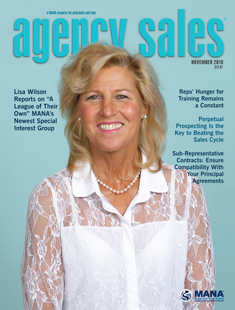 Late last year, Lisa Wilson was contacted by Agency Sales magazine to describe her efforts in spearheading a MANA special interest group for female agency owners called “A League of Their Own.” While that article in the November issue detailed Wilson’s efforts in putting female agency owners together to share and learn from experiences and best practices, there’s more to Wilson’s history as an independent manufacturers’ representative. Her agency, L.S. Wilson & Associates, Inc., Bristol, Wisconsin, specializes in motors, stainless steel coatings, surface preparation products and industrial cleaning solutions.
Late last year, Lisa Wilson was contacted by Agency Sales magazine to describe her efforts in spearheading a MANA special interest group for female agency owners called “A League of Their Own.” While that article in the November issue detailed Wilson’s efforts in putting female agency owners together to share and learn from experiences and best practices, there’s more to Wilson’s history as an independent manufacturers’ representative. Her agency, L.S. Wilson & Associates, Inc., Bristol, Wisconsin, specializes in motors, stainless steel coatings, surface preparation products and industrial cleaning solutions.
According to Wilson, her beginnings as an independent rep can be traced back to her previous experience when she was halfway through her business career. “I was in operations management as a purchasing manager for 23 years. I had a variety of business people including several manufacturers’ sales agents who urged me to make a change and sell for them. I met with one rep who operated his own agency in an effort to understand the pros and cons of going into business for myself. He answered some questions and provided some food for thought. A week after I met with him I received a proposal from him to join him as a business partner.”
Admitting that she was “scared to death” of going into business for herself — a sentiment that’s hardly new to other reps following a similar path — she took that step. “I was at a point in my career where I had the security of a full-time time job and a guaranteed salary. But I also told myself that if I didn’t at least try this, I would blame myself forever for not taking a chance. And, if it didn’t work out, I knew I could always go back inside.” With that as background, she made the move and has been an independent rep for more than two decades. That initial business partnership arrangement lasted for about two years before she opened her own doors as L.S. Wilson & Associates, Inc.
Facing Challenges
Looking back at her career path, Wilson recalls that she encountered a few surprises along the way. “When I first started repping, there were hardly as many females in the profession as there are today. As a result, one of the challenges I initially faced was that of being a female in a male-dominated profession and dealing with businessmen from other cultures that were not used to — or comfortable — dealing with women. My feeling was that I had to work doubly hard in order to prove myself to them and to be successful.” She adds that having more women in the profession today makes this less of a challenge and has made life a little bit easier.
If being a different gender was a concern years ago, being of a different generation is proving to be a concern today. “Today my greatest challenge is how to effectively deal with millennials. The way sales are conducted with members of this generation are completely different from anything I’ve done in the past.”
Finding the Purchaser
“As I look back at how I used to conduct business, it was a matter of cold calling or just picking up the phone and working my way to the right person who made purchasing decisions. Not so today. As an example, during Thanksgiving I was discussing with my niece and her husband how millennials communicate. I offered that it was easier to just pick up the phone and tell someone what I’m interested in. They on the other hand, made the point that if you e-mail or text, then you have an immediate record of your communication — making business that much easier.”
Admitting that you can still cold call and use the phone, Wilson says that she’s had to constantly make adjustments in her approach to business. “For instance, I waited as long as I could when it came to creating a website. I finally did it and am constantly working on updating it and other means of reaching out to customers and prospects. Even then the work isn’t done. Each month you have to adjust key words on your website so when customers are conducting product searches your agency name comes up.”
Staying in Front of Customers
In addition, she cites the need to do all she can to stay in front of customers. “I’ve had to join more and more organizations to be able to meet and network with people at the executive level. I have to admit that I’m still ‘old school’ when it comes to meeting with people. I like to look them in the eye and see how they react when I say something. That’s why participating in industry meetings and trade shows are still ideal for cultivating business.”
Even in the face of all these adjustments to reaching prospects and customers Wilson still believes in the importance of building strong personal relationships. “Even though it’s getting harder and harder to get face-to-face with customers, I don’t know how you can replace that experience. You have to make every effort to get in there to see the customer. You can never assume everything is all right with a customer if you don’t hear from them. You’ve got to remain proactive in contacting them.”
If there’s been a constant challenge in making adjustments when it comes to staying in touch with customers, gaining the attention of principals over the years has been a similar concern. “One thing that I’ve found valuable when it comes to working with manufacturers has been to make an effort to locate principals who have actually been in sales themselves. There’s any number of manufacturers that don’t really know what it takes to get a sale. The most successful manufacturer salespeople are those that have actually operated their own agencies or been in sales for most of their professional lives. Here’s why: when I was in operations and working with reps, I always asked reps what they actually did for a living — how they spent their day; what did they have to do to meet with customers and make a sale? I believe that in this day and age, it’s important for manufacturers to make every effort to know exactly what it takes to run an agency.”
MANA’s Contributions

Lisa Wilson, L.S Wilson, meets with Adela Ortega, president of the Chicago Rail Mechanical Association (CRMA) and Professional Locomotive Services (PLS).
For her part, Wilson explains that when it comes to educating principals as to what a rep does, “I’ve spoken to them about MANA. I’ve urged them to attend MANA manufacturer seminars, go to the MANA website and read Agency Sales, all in an effort to learn what it takes to work successfully with reps.”
If what she’s already mentioned aren’t concerns that weigh heavy on the minds of her and other reps, Wilson went on to mention a couple of things that serve to keep her up at night:
- Unsettled nature of the business — “I guess you have to accept the fact that by its very nature being a rep is being in a business that is always unsettled. You never know what’s going to happen in the future or how it’s going to affect you. Having said that, perhaps that’s one of the things that keeps you motivated as a rep. To combat that, I’ve always made it a point to stay in close touch with my principals to let them know what I’m doing for them and the customer.”
- Pioneering work — When it comes to dealing with principals who expect the rep to work in a territory where there are no existing customers, Wilson explains, “Basically what my approach has always been is to explain to them that if there are no customers and naturally no existing commissions, then it’s going to take a year and sometimes two years to develop business for them. If you’re not willing to pay me up front (some sort of shared territorial development fee), then I need payment on the back end. That’s why I’ll negotiate for life-of-part or life-of-project. My approach in speaking to them is the fact that I’ve got to put gas in my car, pay for a cell phone and land line, and cover other expenses.” She adds that in return for a retainer or shared territorial development fee, “I’ll call on 15-20 new customers, service existing customers and keep them informed about what’s happening in the territory.” Even with that explanation, she admits that more than half of prospective principals don’t want to pay you for your efforts.
- Termination — “When there’s a bump in the relationship between principal and rep, you’re always concerned about being terminated. And, when you’re terminated you want to make sure that you’re fairly compensated for your work. Ideally you want to be able to do that without having to take legal action.”
Finally, when she’s asked what MANA’s contribution has been to her agency’s success over the more than 20 years she’s been in operation, Wilson is quick to respond that “The association has been a big help. They provide a number of valuable tools whether it’s been advice on contracts, teleforums or educational programs. Just availing myself of the educational services, I’ve been able to learn so much from fellow MANA members and manufacturers. Then, there’s Agency Sales magazine which on a monthly basis provides real-world articles and information that I can draw from. Reading what other reps are going through lets me know that I’m not alone.”
MANA welcomes your comments on this article. Write to us at [email protected].

